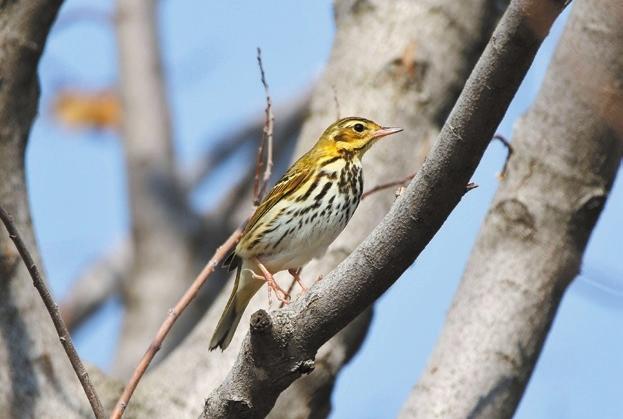
THE Olive-backed Pipit (Anthus hodgsoni) is a small passerine bird of about 15 centimeters in length. This charming species, known for its melodious song and remarkable adaptability, can be found in various habitats across Asia, particularly in the Himalayan region, and for our joy, also in Shenzhen’s parks. This fascinating bird displays a subtle yet distinct plumage, with olive-brown upperparts and a creamy-white underbelly streaked with dark brown. Its small beak is ideally suited for foraging on the ground, and its long, slender legs enable it to navigate through its habitat with agility. Olive-backed Pipits are primarily terrestrial birds, often observed on the ground hopping and running across the forest floor, using their slender beaks to probe the soil and leaf litter in search of food as they forage for insects, spiders, and other small invertebrates. They possess a distinctive habit of wagging their tails while on the ground, which aids in their identification. These pipits are known for their beautiful, high-pitched songs, which they produce during the breeding season. Their melodious calls can be heard cascading through the forests, adding a touch of enchantment to their habitat. During the breeding season, typically from April to June, male Olive-backed Pipits become highly vocal as they establish and defend their territories. They perform captivating aerial displays, accompanied by their melodious songs, to attract females. Once a pair is formed, the male continues to sing to reinforce their bond. The female builds a cup-shaped nest using grass, leaves, and other plant materials; she then lays a clutch of up to five eggs, which she incubates for approximately two weeks. Both parents are responsible for feeding and caring for the chicks once they hatch, ensuring their survival and development until they fledge and become independent. The Olive-backed Pipit plays a vital role in its ecosystem. As insectivorous birds, they help control populations of insects and other invertebrates, contributing to the balance of the ecosystem. Additionally, their foraging behavior on the ground helps to aerate the soil and disperse seeds, inadvertently aiding in the germination and growth of plants. Let’s keep working hard to protect our natural areas so we can enjoy these beautiful birds in our city for generations. | 
